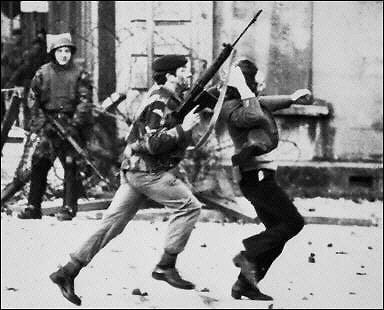 SEVEN former soldiers have gone to court in London to try and derail a PSNI murder investigation into the killing of 13 civilians on Bloody Sunday.
SEVEN former soldiers have gone to court in London to try and derail a PSNI murder investigation into the killing of 13 civilians on Bloody Sunday.
Solicitors acting for the former paratroopers have applied for a judicial review at the High Court over the way the PSNI’s Legacy Investigation Branch is conducting its inquiry following the arrest of a 66-year-old former Lance Corporal on Tuesday.
‘Soldier J’ was detained at his home in Co Antrim and taken to the serious crime suite at Musgrave Police Station in Belfast for questioning. He was released on Wednesday evening on police bail.
Seven of his soldier colleagues claim the murder investigation is being pursued for “political reasons” and have questioned its legality.
It comes as the PSNI warned soldiers they may lose their anonymity if they are charged with murder or other offences.
The PSNI say they will be treated in the same way as any other criminal suspects.
However, lawyers for the seven other soldiers say they are “terrified of reprisals” if their identities became known.
They were granted anonymity by the 12-year-long Saville Inquiry.
On Wednesday solicitors acting for seven men – referred to by Lord Saville as soldiers B, N, O, Q, R, U and V – served emergency proceedings against the PSNI in the High Court in London as a response to the arrest of L/Cpl “J”, who is being questioned over three deaths after being held on suspicion of murder.
It is understood that lawyers acting for the seven men have argued that it would be illegal to arrest any of the soldiers at their homes without notice and remove them to custody in Northern Ireland.
They have requested that the soldiers are given 24 hours’ notice of any arrest, so that they can attend a local police station by appointment.
They have also argued that the murder investigation, launched in 2012, is politically motivated and should be subject to judicial review.
L/Cpl J was he first member of the British armed forces ever to be arrested over Bloody Sunday, in which 14 unarmed civilians were murdered.
The PSNI said earlier this year it expects to arrest seven former soldiers, though it has previously suggested that number could go as high as 20.
On Wednesday it said: “We are not treating suspects in this case any differently from suspects in any other case.”
Currently the PSNI does not name any suspects, leaving the decision of whether to name them down to the province’s Public Prosecution Service when they appear in court.
But Northern Ireland is about to adopt the system used in England and Wales, where suspects are named when they are charged.
The new rule will come into force within months, raising the prospect of Paras being named by police if they are charged with offences next year.





